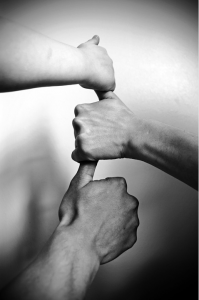The Golden Rule Should Guide Our Every Encounter
In this era of social distancing, our ability to be at peace and find holiness is fortified by the ageless tenets of harmony and love, upon which various religious denominations have built their foundations. For example, the Talmud (Shabbat 31a) recounts an incident wherein a gentile came before Shammai and said, “convert me on the condition that you teach me the entire Torah on one foot.”
Faced with this strange challenge, Shammai pushed the gentile out with a builder’s cubit.
This same gentile came before Hillel and again made his request. Hillel converted him saying, “That which is hateful to you, do not do to another. That is the entire Torah, and the rest is commentary. Go and study.”
In the Gospel of Matthew (Matt 7:12) Jesus teaches the analogous principle “So in everything, do unto others as you would have them do unto you, for this sums up the Law and the Prophets.”
The 12th century Muslim mystic, ethicist, and theologian Abu Hamid al-Ghazali, in his explication of the ninety-nine names of God also instructs similarly, “One is loving-kind among God’s servants who desires for God’s creatures whatever he desires for himself.”

The epic Hindu poem, the Mahabharata (2:235), rings out with a striking echo of this sentiment, as does the Buddhist Udana (5:1), as well as the Analects of Confucius (15:24.)
Throughout the ages, many cultures and societies have developed their own formulations of the ‘Golden Rule.’
In this week’s double Torah portion from the book of Leviticus, Acharei Mot-Kedoshim, we find another archetype of morality, “love your neighbor as yourself.” Despite the fact that Rabbi Akiva describes this precept as encompassing all of the Torah (Sifra 4:12), the dictum itself is actually part of a longer discrete section of the Torah known as the Holiness Code.
The Holiness Code is a series of moral commandments which, although concisely summarized with the Golden Rule, portray the fullness and complexity of what it means to live in a community with other human beings.
Even if we extend the scope of the study to include just the one prior verse, we can learn powerful lessons about how we should relate to one another; “do not hate your sibling in your heart, rebuke your kinsman but incur no sin on their account. Do not take vengeance or bear a grudge against your people, love your neighbor as yourself: I am God” (Leviticus 19:17-18)
In fact, we must understand this commandment as intrinsically different from the Golden Rule.
One may not desire rebuke, but it is inextricably tied to the act of loving one’s neighbor. The Golden Rule, in all of its iterations, is described by Rabbi Lord Jonathan Sacks as ‘a rule of reciprocity,’ distinct from the mitzvah “to love” which is, “something altogether different and more demanding.” (The Ethic of Holiness)
This commandment, “to love,” is not localized to one’s neighbor. Later in this week’s Torah portion we also read, “when a stranger resides with you in your land, you shall not wrong them. The stranger who resides with you shall be to you as one of your citizens; you shall love the stranger as yourself, for you were strangers in the land of Egypt: I am the Eternal your God.” (Leviticus 19:34)
Why are we charged with this high standard of behavior?
The answer can be found at the beginning of the chapter, “You shall be holy, for I, the Eternal your God, am holy.”
Holiness is defined in this week’s Torah portion by the ethical treatment of – and love for – one another. We can be holy if we, like God, exhibit our love for humanity. The inherent value of our neighbor is no greater than that of the stranger, because all of us are created “in the image of God.” (Genesis 1:27)
In this age of social-distancing, when our expressions of love are limited by practical necessity, may we endeavor to live out our love through our adherence to the moral and ethical principles set forth by our religious traditions.
My childhood rabbi, Jack Romberg, fondly connects this week’s Torah portion to the great American icon Mr. Rogers, who taught all of us the importance of love and care for our fellow human beings through the timeless song, “Won’t You Be My Neighbor?” Like Mr. Rogers, through technology, we can virtually connect to people all over the globe.
We can and must continue to connect to our own communities too, even from a distance. Now, more than ever, we must take up the mantle of compassionate justice individually, because the health and safety of our fellow human beings are dependent on each of us.
May we strive towards a world of neighbors, a just world wherein every stranger is welcomed, a world filled with love.
* * * * *
With houses of worship currently closed across much of the nation, the editors of the Baltimore Post-Examiner are inviting an array of spiritual teachers to share insights from the ages along with words of comfort and encouragement. These timely messages are not exclusive to any particular faith walk and will be included in our ongoing Spirituality series.

Preston Neimeiser is a rising 5th-year rabbinical student at the Hebrew Union College – Jewish Institute of Religion in New York City. A native of Tallahassee, Florida, Preston serves as the student rabbi of the B’nai Israel Synagogue in High Point, North Carolina and the rabbinic intern at Tamid: The Downtown Synagogue. This summer, Preston will be working with the New Sanctuary Coalition as part of his fellowship at T’ruah: The Rabbinic Call for Human Rights. In addition to his love of music and learning, he is dedicated to interfaith endeavors and a more just and peaceful world.


Amen. Thank you Preston Neimeiser for invoking the power of love to help us heal in this difficult moment.